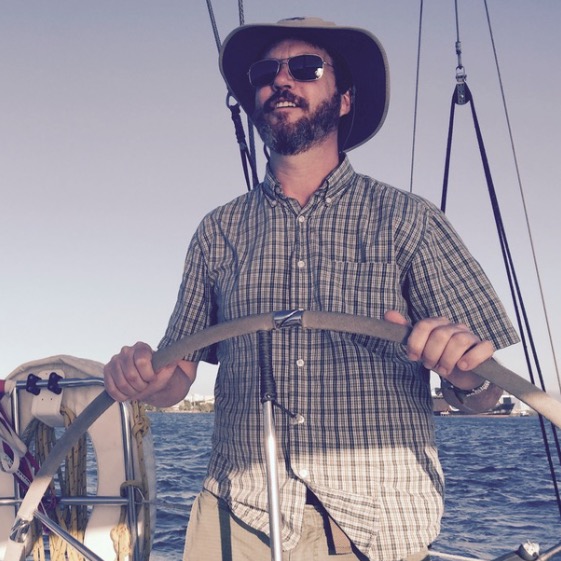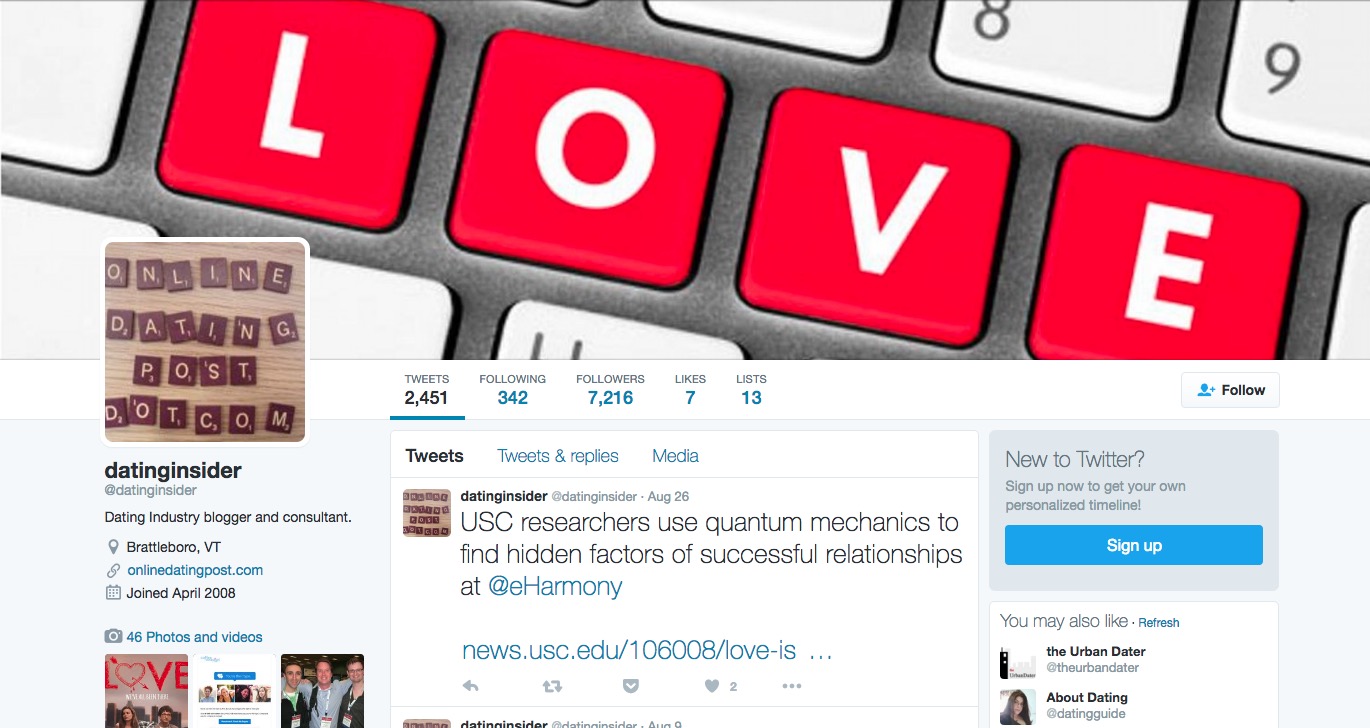Today’s guest post is by Jeff Kauflin, who is writing a book about online dating. An article he wrote about the Match.com founder Gary Kremen recently appeared in Business Insider. Jeff is also Director of Operations at Marketing Evolution, a marketing consulting firm in Manhattan. He can be reached at kauflin@gmail.com.
In early 1995, before Match.com and eHarmony.com were live on the web, before 90 percent of Americans had Internet access, an online-dating site called AmericanSingles.org was up and running. Dan Bender, a self-taught software developer and jack of many trades, had the idea to start a free dating website.
American Singles launched on February 14, 1995. According to Bender, it was only the second online-dating site to go live in the U.S. And just two years after its launch, American Singles often landed in the top 30 of the world’s most trafficked websites.
Born in Heidelberg, Germany, Bender moved with his family to Southern California when he was three. “For various reasons, I was not the average kid,” he recalls. He was a loner, not into sports, and a lifelong vegetarian. In school he carried around a leather bag to hold his books, which was typical for Germans, but not for Americans, who usually carried their books in their arms. “That damn bag was a constant source of teasing, and it was frequently taken or hidden from me,” Bender says. Yet he didn’t stop using it. Bender never felt compelled to change, and he carried this approach for the rest of his life.
Bender was a late bloomer to the dating world; he didn’t get started until his 20’s. His nonconformist nature made it particularly difficult for him to meet women, so he decided to try his luck at video dating services, newspaper personals, and then Prodigy, the online service that pre-dated the web and once competed with AOL. On Prodigy, he met his wife.
Meanwhile, Bender had been pursuing an eclectic career spanning various fields, including broadcasting, real estate management, and computer consulting. In the early 1990s, he began considering computer-based dating as an area for a business opportunity, so he took on software development projects in the industry. First, he worked at a 900-number dating service for swingers. When that company imploded, he worked for Connection magazine, a swingers publication. Bender “wasn’t thrilled” about working in such a risqué niche, but these companies had the database technology he was interested in. Later he worked in database development at Helena VIP, a Hollywood-based Jewish matchmaker that charged customers from $5,000 to $50,000.
While exploring the dating industry as both a user and a developer, Bender saw weaknesses in the available services, as they were often expensive and ineffective. He thought there must be a better way. And then… the World Wide Web appeared.
Bender quickly recognized an opportunity. In late 1994, he went to San Francisco to meet Rich Gosse, the man who owned the largest nonprofit singles organization in the country. Founded back in 1978 as American Singles Education, Gosse’s nonprofit aimed to help people find love by offering classes, organizing singles events, and distributing a personals newsletter.
When Bender pitched the online-dating website idea, Gosse was sold. Soon they adopted both the name and the nonprofit nature of Gosse’s organization for AmericanSingles.org. Bender liked the idea of launching a free site, because he thought a membership fee would intensify the social stigma. He had heard people say, “If I have to spend money to find love, then there must be something wrong with me.”
Shortly after it hit the web, American Singles grew rapidly. Bender and Gosse paid the bills through a combination of user donations and advertising, and for periods of time, they brought in $20,000 in donations per month.
Bender was running the show tirelessly. But his friends and family, including his wife, were telling him he should stop wasting his time, give up his hobby, and get a real job. They called him stupid for not charging customers.
Their opinions didn’t affect him. “I lost not a second of sleep because I knew instinctively that I was right,” Bender says. The site was growing every day, and users seemed satisfied. He kept reminding people of his strategy: “Fill the stadium for free. Sell ‘em peanuts.” Nothing could make him stray from his vision, just as nothing could keep the young Bender from carrying his leather bag. To him, it just made sense.
Bender was working 100-hour weeks to handle the site’s growth. Sometimes, if the site’s servers crashed, he would take the 30-minute drive to Cleveland at 2:00 A.M. to reset them. Although Bender found the endeavor exciting, it was also overwhelming.
Marketing was another critical ingredient in Bender’s recipe for growth. Gosse had thousands of contacts in the media, and his efforts generated national press coverage for American Singles. By 1999, without having spent any money on paid advertising, their site boasted 250,000 personal ads, a huge number by industry standards. And it had made at least 10,000 love connections, or what Bender called “happy endings”—users asking for their ads to be removed because they had met someone and were in a committed relationship.
As the late 1990s approached, Bender had his head down, buried “in the operational sand.” He was sending 500 emails per day to provide prompt customer service. He knew little about the competitive landscape. Then one day, MatchNet, the owner of JDate.com, approached American Singles in an attempt to buy them out.
Bender says he became somewhat caught up in the frenzy of the Internet bubble in 1999, as he began to entertain the MatchNet offer. Gosse thought it was time to cash out, because the other major player in online dating, Match.com, had a strong user base, much more money to burn, and was poised to dominate the category. In May 1999, they sold American Singles as part of deal to MatchNet for $3.6 million.
Bender is about as fair and generous as they come, perhaps to a fault. Although he had come up with the idea for their business and invested the most time into it, he had asked Gosse and an attorney named Will Knedlik to join as equal partners, which meant they split the $3.6 million equally between the three of them.
Today, Bender deeply regrets the sale. “Had the site been developed to the next level, I think it could easily have sold for $10 million or more a year later,” he says. It pains him to see the current success of PlentyOfFish.com, the free site with more page views than any other online-dating site in the country. “That’s where American Singles should be today! Instead of a memory from the past.” American Singles’ parent company, which changed its name from MatchNet to Spark Networks in 2005, retired the site in 2009 in a strategic shift to focus on its niche dating sites.
But since American Singles, Gosse and Bender’s lives have been far from boring. Gosse began organizing events for “cougars”—adult women who are attracted to younger men (“cubs”). His “Cougar Cruises” are extremely popular; they often have a waiting list for “cubs” eager to get aboard. Meanwhile, Bender has become an avid world traveler. Recently he refreshed his video production skills; he’s now in line to work on two documentary projects.
Bender doesn’t see a future for himself in online dating, neither professionally nor personally. He says the technical complexity and marketing costs involved in launching a site today are too tough to overcome.
And a few years ago, Bender had the opportunity to join the many customers he once served. After going through a divorce, he signed up for Match.com. He didn’t reach a “happy ending,” as he was plagued by the “kid in the candy store effect.” But he doesn’t expect online dating to work for everyone. “No one size fits all,” he says.
Despite Bender’s plans not to reenter the industry, he’s grateful for its positive social impact. “It gives the shy wallflower the option to get into the dating game,” he says, admitting that he once counted himself among that group. And Bender sees online dating as a “needed tool for singles from different cultures, regions and lifestyles.” It allows people to connect based on limitless criteria, and for a broad-minded nonconformist like Bender, that’s the biggest win of all.

